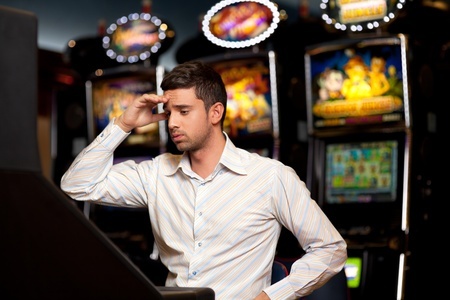Problem Gambling New Zealand
- Problem Gambling A New Zealand Perspective On Treatment
- Problem Gambling New Zealand Rugby
- Problem Gambling New Zealand Immigration
- New Zealand Problem Gambling Levy
But a new report to the council's Regulatory Committee illustrates the sheer scale of problem gambling in South Auckland. According to the council report over half the people in Auckland seeking treatment for pokie machine gambling addictions are from South Auckland. And just over half of those seeking help are gaming machine users. New Zealand’s Ministry of Health (MoH) has said it is assessing the use of technology to address the issue of problem gambling in the country, amid a public consultation for its future strategy to prevent and minimise gambling harm. The MoH launched the consultation last month. It undertakes a refresh of the strategy every three years and the. The phrases ‘pathological gambling’ and ‘problem gambling’ are often used interchangeably, with the term ‘pathological’ more frequently used in the United States and ‘problem’ more common in Australia and New Zealand. ‘Problem gambling’ is also sometimes used to describe an intermediate or subclinical form of the disorder. Progress on Gambling Harm Reduction 2010 to 2017: Outcomes report – New Zealand Strategy to Prevent and Minimise Gambling Harm Published 04 April 2019 This publication reports on the gambling harm minimisation outcomes that have been achieved since the passage of the Gambling Act in 2003.
What is the problem?
Gambling is an activity that can be fun and sometimes profitable. The problem lies in the addiction, which begins to form as the fun continues over time. In New Zealand, the statistics show that at any given moment 0.3% to 1.8% of people are likely to be deemed as a problem gambler. This means that at any given time, 10,000 to 60,000 people are playing casino or Lotto games. According to the New Zealand’s Gambling Act of 2003, a problem gambler is defined as a person whose gambling causes harm or could cause harm. Through questionnaires, it has been learned that Pacific and Maori women are more likely to become problem gamblers and experience the harm that comes with gambling.
The rippling effects of gambling


We may believe that gambling is a fun activity and will not affect anyone but the player. Unfortunately, this is not the case. Some of the ways that other people are affected include:
- Poor Parenting
- Family violence
- Crimes to others (beatings, theft, murder, etc.)
- Suicide
When children see their parents not caring about them or taking money to feed the family and gambling it away, the children suffer and learn no other way to live. Violence within the family then leads to violence outside the family, and eventually a parent or both could become a new member in the local jail. At any given time, seven to seventeen people are involved in the repercussions of one gambler. This can be calculated to 500,000 people bearing the repercussions of gambling per one gambler. This is astounding!
A gambler may seek help and get over the addiction, but the consequences may last for a lifetime. For example, people living in a low-income development have a higher risk of becoming problem gamblers. The parents are poor examples for the children. The children then grow up and repeat the same cycle.
Problem Gambling A New Zealand Perspective On Treatment
In conclusion, New Zealand has a problem with gambling and we have to focus on developments in treatment in order to attack this problem. Gambling has repercussions that can last a lifetime and then create problems for children or other family members involved. Reaching out for help can be hard, but it is so important to creating a solution to this problem.
What is the problem?

Gambling is an activity that can be fun and sometimes profitable. The problem lies in the addiction, which begins to form as the fun continues over time. In New Zealand, the statistics show that at any given moment 0.3% to 1.8% of people are likely to be deemed as a problem gambler. This means that at any given time, 10,000 to 60,000 people are playing casino or Lotto games. According to the New Zealand’s Gambling Act of 2003, a problem gambler is defined as a person whose gambling causes harm or could cause harm. Through questionnaires, it has been learned that Pacific and Maori women are more likely to become problem gamblers and experience the harm that comes with gambling.
The rippling effects of gambling
We may believe that gambling is a fun activity and will not affect anyone but the player. Unfortunately, this is not the case. Some of the ways that other people are affected include:
- Poor Parenting
- Family violence
- Crimes to others (beatings, theft, murder, etc.)
- Suicide
When children see their parents not caring about them or taking money to feed the family and gambling it away, the children suffer and learn no other way to live. Violence within the family then leads to violence outside the family, and eventually a parent or both could become a new member in the local jail. At any given time, seven to seventeen people are involved in the repercussions of one gambler. This can be calculated to 500,000 people bearing the repercussions of gambling per one gambler. This is astounding!
Problem Gambling New Zealand Rugby
A gambler may seek help and get over the addiction, but the consequences may last for a lifetime. For example, people living in a low-income development have a higher risk of becoming problem gamblers. The parents are poor examples for the children. The children then grow up and repeat the same cycle.
Problem Gambling New Zealand Immigration

New Zealand Problem Gambling Levy
In conclusion, New Zealand has a problem with gambling and we have to focus on developments in treatment in order to attack this problem. Gambling has repercussions that can last a lifetime and then create problems for children or other family members involved. Reaching out for help can be hard, but it is so important to creating a solution to this problem.